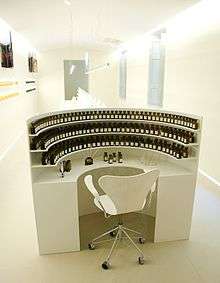Perfumer
A perfumer is an expert on creating perfume compositions, sometimes referred to affectionately as a Nose (French: le nez) due to their fine sense of smell and skill in producing olfactory compositions. The perfumer is effectively an artist[1] who is trained in depth on the concepts of fragrance aesthetics and who is capable of conveying abstract concepts and moods with fragrance compositions. At the most rudimentary level, a perfumer must have a keen knowledge of a large variety of fragrance ingredients and their smells, and be able to distinguish each of the fragrance ingredients whether alone or in combination with other fragrances. As well, they must know how each ingredient reveals itself through time with other ingredients. The job of the perfumer is very similar to that of flavourists, who compose smells and flavourants for many commercial food products. The practice of perfume-making has recently attracted academic interest among major research funding agencies.[2]

Training
Most past perfumers did not undergo professional training in the art and many learned their craft as apprentices under another perfumer in their employment as a perfume technician (in charge of blending formulas) or chemist.These people were usually given a temporary job in the perfume industry. A direct entrance into the profession is rare and those who do typically enter it through family contacts. Such apprenticeships last around 3 years.
Until recently, professional schools open to the public for training perfumers did not exist. In 1970 ISIPCA became the first school in perfumery. The candidates must endure a demanding entrance examination and must have taken university-level courses in organic chemistry.
Since 1998 PerfumersWorld's perfumery school[3] has offered formal and informal perfumer training through university courses at King Mongkut's University of Technology Thonburi Biotechnology faculty, at Chulalongkorn University Pharmacy faculty and through on-line courses and private workshops in the United States, UK, Dubai, Hong Kong, Germany, New Zealand and Thailand.
More recently, in 2002, another perfumery school was born, the Grasse Institute of Perfumery (G.I.P). Similarly here, the ideal candidates must have a foundation in chemistry or pharmacy in order to be accepted as student perfumer (élève perfumer).
Givaudan, International Flavors and Fragrances (IFF) and Symrise have perfumery schools as part of their companies, but students must be employees of the company and must be recommended by their superiors for acceptance into the school. The University of Plymouth (UK) offers a BA (Bachelor of Arts) course in Business & Perfumery.
Employment
Most perfumers are employed by several large fragrance corporations in the world including Mane, Robertet, Firmenich, IFF, Givaudan, Takasago, and Symrise. Some perfumers work exclusively for a perfume house or in their own company, but these cases are not as common.
The perfumer typically begins a perfume project with a brief by the perfumer's employer or an outside customer. The customers to the perfumer or their employers, are typically fashion houses or large corporations of various industries. Each brief will contain the specifications for the desired perfume, and will describe in often poetic or abstract terms what the perfume should smell like or what feelings it should evoke in those who smell it, along with a maximum per litre price of the perfume oil concentrate. This allowance, along with the intended application of the perfume, will determine what aromatic ingredients will be used in the perfume composition.
The perfumer will then go through the process of blending multiple perfume mixtures and will attempt to capture the desired feelings specified in the brief. After presenting the perfume mixtures to the customers, the perfumer may "win" the brief with their approval. They proceed to work with the customer, often with the direction provided by a panel or artistic director, which guides and edits the modifications on the composition of the perfume. This process typically spans several months to several years, going over many iterations and may involve cultural and public surveys to tailor a perfume to a particular market. The perfume composition will then be either used to enhance another product as a functional fragrance (shampoos, make-up, detergents, car interiors, etc.) or marketed and sold directly to the public as a fine fragrance.
Alternatively, the perfumer may simply be inspired to create a perfume and produce something that later becomes marketable or wins a brief. This is more common in smaller or independent perfume houses.[4]
List of notable perfumers
- Henri Alméras
- Nicolas de Barry
- Ernest Beaux
- Calice Becker
- Jean Carles
- Jacques Cavallier
- Germaine Cellier
- François Coty
- Roja Dove
- Stephen Dowthwaite
- Jean-Claude Ellena
- André Fraysse
- Olivia Giacobetti
- Sophia Grojsman
- Jean Kerléo
- Karyn Khoury
- Francis Kurkdjian
- Christophe Laudamiel
- Norina Matchabelli
- Annick Ménardo
- Alberto Morillas
- Patricia de Nicolaï
- Jacques Polge
- Henri Robert
- Maurice Roucel
- Edmond Roudnitska
- Christopher Sheldrake
References
- Glen O. Brechbill. "The Perfumers - An Index to the Aromatic Artists" (PDF). Perfumerbook.com. Archived from the original (PDF) on 2011-06-27. Retrieved 2017-06-24.
- "The SNSF P3 Grant Search Database". P3.snf.ch. Retrieved 24 June 2017.
- PerfumersWorld. "Perfumery School | PerfumersWorld". Perfumersworld.com. Retrieved 2016-12-04.
- Burr, Chandler (2003). The Emperor of Scent: A Story of Perfume, Obsession, and the Last Mystery of the Senses. New York: Random House. ISBN 978-0-375-50797-7.
External links
| Wikimedia Commons has media related to Perfume. |
- The British Society of Perfumers The British Society of Perfumers
- Zooming into Practices of Perfumers Scent Culture Institute